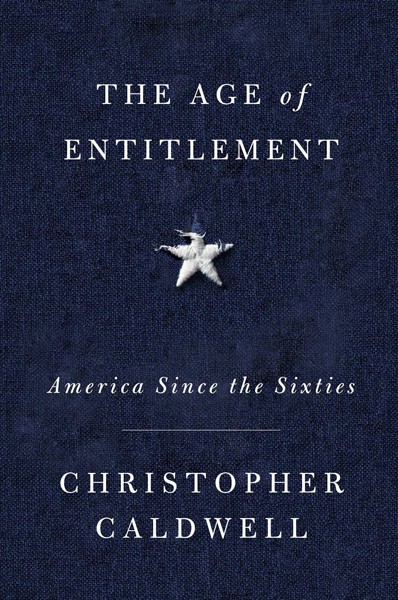Waking from Our Dogmatic Slumber
Winston Taney, American Renaissance, January 31, 2020
Christopher Caldwell, The Age of Entitlement: America Since the Sixties, Simon & Schuster, 2020, 352 pp., $17.39 (Hardcover), $14.99 (Kindle)
As I was reading Christopher Caldwell’s Age of Entitlement, I kept thinking of how Immanuel Kant’s career took a sudden shift after he read David Hume’s groundbreaking theory of causation. As Kant put it, Hume’s theory “interrupted [Kant’s] dogmatic slumber.” He did not adopt Hume’s theory, but Kant found it so provocative that it changed the direction of his work — transforming him from a run-of-the-mill professor in his late 50s into a great philosopher.
Christopher Caldwell, a senior fellow and contributing editor of the Claremont Review of Books, seems to have had a similar awakening. His most recent book, Age of Entitlement, has stirred up controversy by tracing many 21st century political disorders to the 1960s civil-rights movement. The book also violates many of the orthodoxies that, for the past two generations, have blinded Americans to the reality of race relations.

Just as Hume woke up Kant, it seems that the 2016 election and dissident ideas on race and immigration did the same for Mr. Caldwell — but there is a difference: Kant credited Hume for waking him up, but Mr. Caldwell does not cite a single racial dissident despite his obvious intellectual debt. He writes throughout the book — as if he thought of it all by himself — that the Civil Rights Act of 1964 and the Immigration Act of 1965 transformed the American constitutional and social order in ways that have cost billions of dollars and have doomed any realistic possibility of social cohesion.
Mr. Caldwell also gores such sacred cows as Brown v. Board of Education (he questions both its legal reasoning and its wisdom as policy), the legacy of Martin Luther King Jr. (he suggests King was not committed to color-blindness), and whether diversity is a strength (Mr. Caldwell notes that until the Supreme Court’s affirmative action decisions, diversity was generally thought to be a weakness).
The book is mainly about how we got here. Why are whites allowing themselves to become a minority in a nation riven by race? How did Americans come to accept these transformations — and even celebrate them as moral triumphs?
The book’s thesis
Mr. Caldwell argues that white Americans accepted the civil rights movement and the transformations that followed because of the particular conditions that prevailed after the Second World War. The country was thrust into the unfamiliar position of being a superpower, and this produced a national hubris, an unprecedented willingness to experiment with social relations. The very pillars of society — racial identity, family roles, and religious commitments — were now thought to be contingent and unnecessary, as though they could be removed or altered without consequence.
At the same time, a sharp rise in economic prosperity produced a faith in expertise, leading politicians to believe they could solve the perennial race problem. These experts dismissed the social conventions of past generations that permitted voluntary association. Their thinking was simple: Make people eat, sleep, and work together, and presto, problem solved.
Mr. Caldwell argues that the social experiments of the 1960s were a naïve outgrowth of America’s cultural homogeneity and provinciality. The Baby Boom hippies were more racially inn
Racial naivete made Americans believe that national legislation could create racial harmony, but Mr. Caldwell notes that blacks and whites were not equally naive: “White people knew a lot less about black people than blacks did about white people. Whites had not thought much about what it would be like to live at close quarters with blacks — if indeed they thought that would be the result of civil rights legislation at all.” Blacks seemed to understand what civil rights legislation would do; whites did not.
Mr. Caldwell suggests this myopia stemmed from the traditional view of the United States. He writes that until the civil rights movement, “Americans understood themselves as they always had — as essentially a European country, displaced westward.” But “[t]he Hart-Celler bill would alter the demography of the United States,” and “would also alter the country’s culture, committing the government to cut the link that had made Americans think of themselves for three centuries as, basically, a nation of transplanted Europeans.” This conviction that America was part of Europe gave whites a sense of insulation from what the 1960s legislation was actually doing to their identity and their future.
Idealistic immigration and race policies could arise only in a nation that had characteristics those very policies would destroy. As Mr. Caldwell puts it: “Reforms conceived for a country that was provincial, dutiful, and 4 percent immigrant are not necessarily well suited to a country that is cosmopolitan, hedonistic, and 15 percent immigrant. The America of the 1960s had a leeway for safe experimentation that it would not regain.”
What do we do now?
The book is a chilling description of how far America has fallen, economically and culturally, and it is all the more chilling because Mr. Caldwell refuses to offer solutions. He implies that the vast diversity bureaucracy and demographic transformation itself should somehow be reversed. But he never says so explicitly. Nor does he consider whether ethnic division could lead to secession or nullification.
Even though the Age of Entitlement offers no solutions, it could shift the conversation on race and politics in a way that no other mainstream book has done since the Bell Curve. If it does so, it could be one of the most important books of the decade. It is now #1 on New Releases on Historical Study at Amazon. Just as the 2016 election interrupted Mr. Caldwell’s dogmatic slumber, this book could do the same for American readers.
To whom I say: “Good morning from a long sleep, America. We’ve got a lot of work to do.”















